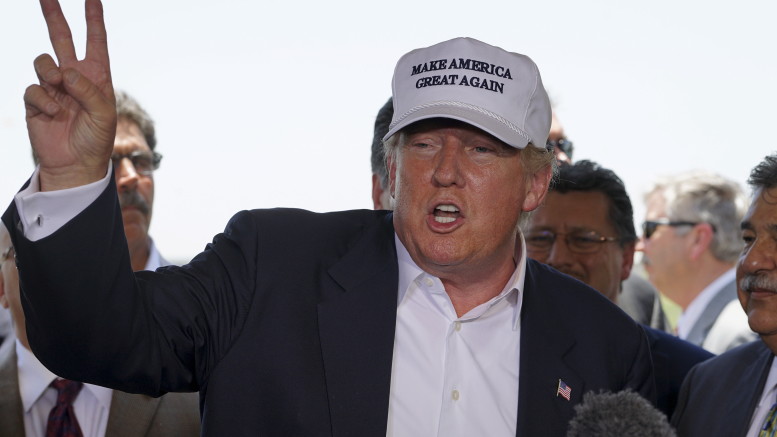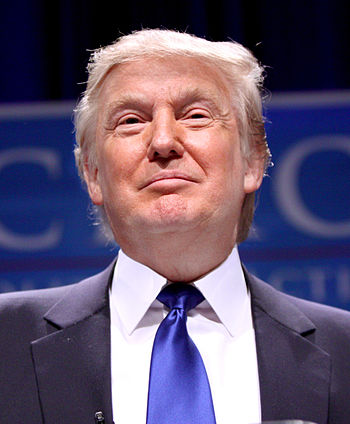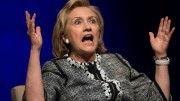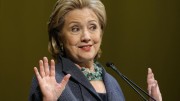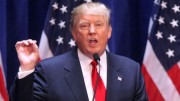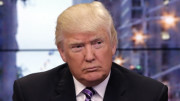The Republican Party is desperate to prevent outsider Donald Trump from representing them in the November 8 elections for president and Trumps rhetoric has fueled attacks from concerned Democratic frontrunner Hillary Clinton whose popularity remains in neutral in the face of a strong challenge from outsider Bernie Sanders.
By Ray Hanania
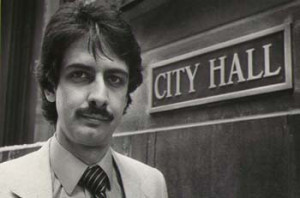
Ray Hanania
Real estate mogul and celebrity TV personality Donald Trump fended off attacks from all sides Tuesday winning seven of Super Tuesday’s 11 major Republican election contests and reinforced his lead.
Rival Senator Ted Cruz won three including his home state of Texas, and Oklahoma and Alaska, but ran second and third in others alternating with Senator Marco Rubio of Florida in contests in Georgia, Vermont, Virginia, Alabama, Massachusetts, Tennessee, and Arkansas.
The election gave momentum to Rubio who has tried to position himself as the Republican Party alternative to Trump, but he was able to win only one state, Minnesota. Republican Governor of Ohio John Kasich surprised many observers and ran second in two states.
(Colorado only held a Democratic caucus Tuesday but did not hold a Republican caucus. Wyoming held a caucus for Republicans but offered no delegates.)
On the Democratic side, former U.S. Senator and Secretary of State Hillary Clinton defeated Senator Bernie Sanders in seven of the 11 Democratic state contests, solidifying her position as an unbeatable longtime political stalwart. Sanders defeated Clinton in his home state of Vermont, and in Oklahoma, Minnesota and Colorado.
Trump has drawn the anger of Muslims worldwide when he declared he would impose a ban on Muslim entry to the United States as a means of battling rising terrorism. But, Trump has also vowed he will not take sides in negotiations between Israelis and Palestinians, a significant break with the longstanding American foreign policy favoring Israel.
Trump survived despite attacks that came from almost every direction, except from the voters. Trump was denounced by President Barak Obama, and also by the Republican Speaker of the House Paul Ryan. He was denounced by Rubio for failing to renounce support from Ku Klux Klan leader David Duke and Nation of Islam leader Louis Farrakhan. Rubio also denounced Trump as a “con artist” and the two swapped of-colored jokes about each other during their campaigns.
Trump won endorsements from former rival Chris Christie, the Governor of New Jersey, former Vice Presidential candidate Sarah Palin, Jerry Falwell Jr., and the rightwing Christian Evangelist and President of Liberty University. But Trump’s biggest endorsement was a surprise, from former Democratic President Jimmy Carter who won a Nobel Peace Prize for ushering in Middle East peace in the 1970s with the signing of the Egyptian-Israeli peace accords.
Carter told the British Parliament on Super Tuesday that if he had to choose between Trump and Trump’s second place rival Cruz, he would back Trump. Carter explained that he believed that despite some tough talk on banning Muslims, Trumps views were “malleable.”
Trump’s popularity seems to stem from his position as being perceived as an outsider to the nation’s established political system which has failed to heal the nation’s ailing economy, stop the violence and terrorism from al-Qaeda and ISIS supporters, and improve the nation’s educational system.
If Trump and Clinton continue to hold on to their leads in the remaining 35 states and territories, voters may find themselves choosing not between a Republican or a Democrat but rather between Clinton, the veteran politician and political insider, and Trump, the successful businessman and a political outsider.
Trump continues to be the frontrunner in the Republican race for the White House, not only winning the most states and delegates but building unstoppable momentum as elections move from the South to the Midwest and East.
The irony of Trump’s resounding beating back of his Republican rivals is how desperate they were to force him to sign the “Loyalty Pledge” back in August of 2015.
At that time, in the first Republican Debate, Trump refused to rule out a run as an independent candidate. That declaration sent shockwaves through the Republican establishment and Republican National Committee Chairman Reince Priebus publicly pushed Trump to promise to back the GOP frontrunner.
How ironic and typical of the Republican right today that as Trump now leads the pack, his desperate Republican rivals are vowing that they won’t support Trump if he is the Republican Party nominee.
The issue of “loyalty” is a key issue among voters who are backing Trump. Polling shows that many of Trumps supporters are voters who are disgusted and fed up with traditional party leaders who say one thing and do something else.
The Republican party is desperate to stop Trump, but they may have no other choice. Any effort to launch a battle to deny Trump the nomination at the Republican National Convention this summer will only reinforce the voter perception that the GOP leaders are hypocrites with two standards.
Voters go to the ballot boxes in six states this Saturday (March 5) including in Arkansas, Kansas, Kentucky, Louisiana, Maine and Nebraska.
Michigan, Mississippi, Idaho and Hawaii have elections on March 8. Polls show Trump leading by a wide margin in Michigan. And the big election sweep will continue on March 15 with election contests in five major states including Florida, Rubio’s home state, Illinois, Missouri, North Carolina, and Ohio.
Click here for the election schedule.
Unorthodox or not, Trump’s strategy of telling voters what he thinks at the moment has an appeal to many voters disenchanted with the weak American economy, rising unemployment rate, rising terrorism and violence, and the hypocrisy of establishment candidates who tell voters what they want to hear but act differently on issues once they are in office.
Super Tuesday polling showed that Trump’s populist approach resulted in a record turnout of Republicans by more than 24 percent, while the Democratic voter turnout was 21 percent lower than four years ago which could help Trump in a fight with Clinton.
Many things can change as the primary election process comes to a close this summer. But one thing is certain this week. Donald Trump has tapped into a public need for change. Change in their leadership and change in policies and practices that could even include a change in how American views the Middle East.
Trump holds the “trump” card, however in this battle. When he first ran, Republican Party leaders demanded that Trump pledge to support a Republican if he lost. But today, the tables have turned and the question is whether or not the Republican political leadership will support him as he comes closer to winning a majority of the GOP Delegates.
The Issue of Middle East Peace moves center stage, pushed by PAC funding
The issue of Middle East peace may be pivotal in a Clinton-Trump election battle. And that could make Trump’s rise bittersweet to Muslims.
Trump’s Muslim ban has angered Muslims, but most Muslims are not Arab and may not have the same attachment to Palestine. And the Muslim ban rhetoric has attracted support from mainstream Republicans who have been bashing Muslims daily since 9/11.
Trump said a ban would only last until his administration could better identify potential religious terrorists. And he tried to clarify his comments saying that the real issue is stopping terrorists from entering the United States from Muslim countries. He said a ban would be temporary and not affect Muslims who are already American citizens.
Trump’s promise to remain neutral in negotiations between Israel and the Arabs might not be enough to off-set the anger from Muslims over his ban on Muslim immigrants, but it might be enough to ameliorate Arab Muslims who have never experienced an America that was fair or balanced in dealing with the issue of Palestine, the heart of Arab culture.
Trump positions on the Middle East challenge America’s longstanding pro-Israel bias and rejecting the influence of Israel’s powerful lobby, AIPAC. That would be unprecedented, not just conflicting with the views of his Republican Party rivals and leadership, but also with most Democratic leaders who also have long favored Israel’s continued occupation over Palestinian rights.
Until now, presidential election contests have pivoted on candidates arguing about who is more pro-Israel.
Cruz and Rubio immediately criticized Trump claiming that he is “weak” on Israel. And Rubio has been receiving massive financial support not only from the Israel lobby but also from Sheldon Adelson, the super wealthy publisher of Israel’s largest newspaper, Israel Hayom.
Adelson also owns the Las Vegas Review-Journal Newspaper, a casino and convention center in Las Vegas, and casinos in Macau and Singapore.
Cruz has repeatedly said that anyone who criticizes Israel “is un-American” and asserted at a conference of Christian Arabs that “those who hate Israel also hate America.”
Rubio, the son of Cuban immigrants who grew up watching Communist leader Fidel Castro repeatedly embrace the late PLO leader Yasir Arafat, denounced all Palestinians as being terrorists who reject peace and “teach little kids – five-year-olds – that it’s a glorious thing to kill Jews.” The statements are denounced as racist and play into anti-Muslim racism in the country. Many Muslims who have criticized Trump for his ban are also criticizing Rubio as being no better.
Adelson’s support has fueled Rubio’s decision last week to attack Trump’s Middle East policies, calling Trump “anti-Israel.” It is very possible that Trump’s Middle East positions may reflect his longstanding business rivalry with Adelson.
Trump also appealed to the despondency of American Arab voters when he strongly criticized the Iraq war, saying it destabilized the Middle East and fueled the spread of al-Qaeda and the rise of Daesh (ISIS).
Trump’s position on Iraq could put Hillary Clinton on the political defensive. Despite criticizing the Iraq War, as a U.S. Senator at the time, Clinton voted in favor of the 2002 resolution introduced by former President George W. Bush to authorize the American invasion of Iraq.
Trumps unorthodox views on the Middle East could also be an issue with Hillary Clinton in other ways. Clinton’s husband, former President Bill Clinton, has been accused of undermining his years of pursuing Israeli-Palestinian peace during the months in office when he tried to force Arafat to abandon the Right of Return and claims to Arab East Jerusalem during negotiations at Camp David in 2000 with then Israeli Prime Minister Ehud Barak. Many believe the proposals were designed by Barak and pushed by Clinton.
(Ray Hanania is an award winning former Chicago political columnist and writer. Email him at [email protected].)
Ray Hanania
Hanania covered Chicago political beats including Chicago City Hall while at the Daily Southtown Newspapers (1976-1985) and later for the Chicago Sun-Times (1985-1992). He published The Villager Community Newspapers covering 12 Southwest suburban regions (1993-1997). Hanania also hosted live political news radio talkshows on WLS AM (1980 - 1991), and also on WBBM FM, WLUP FM, WSBC AM in Chicago, and WNZK AM in Detroit.
The recipient of four (4) Chicago Headline Club “Peter Lisagor Awards” for Column writing. In November 2006, Hanania was named “Best Ethnic American Columnist” by the New American Media;In 2009, he received the prestigious Sigma Delta Chi Award for Writing from the Society of Professional Journalists. Hananiaalso received two (2) Chicago Stick-o-Type awards from the Chicago Newspaper Guild, and in 1990 was nominated by the Chicago Sun-Times for a Pulitzer Prize for his four-part series on the Palestinian Intifada.
Hanania’s columns are published by the Illinois News Network every week. You can reprint his columns with full credit to the author, using the shirttail and without content edits. Hanania is also President/CEO of Urban Strategies Group media and public affairs consulting which has clients in Illinois, Florida, Michigan and Washington D.C. His personal website is www.TheMediaOasis.com, and www.UrbanStrategiesGroup.com. Email him at: [email protected]
Latest posts by Ray Hanania (see all)
- Election Analysis: Trump taps public’s desire for change - March 3, 2016
- New book on Body Eternal Spirit exercises - February 29, 2016
- Election Analysis: Jason Gonzales can’t hide from his past - February 26, 2016

